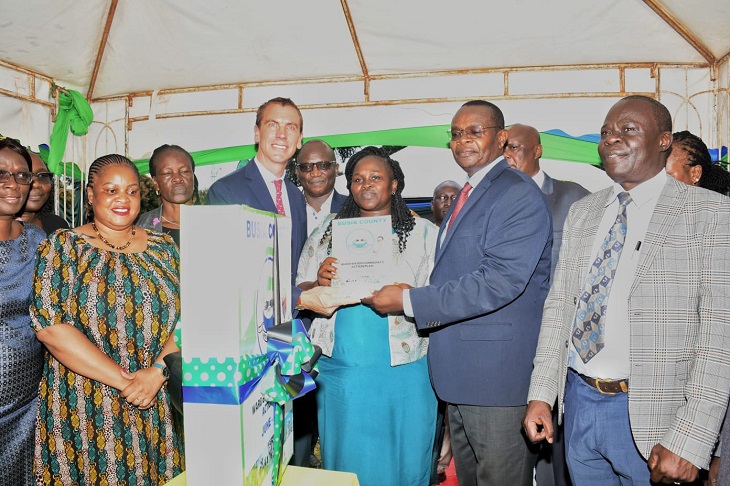The British Deputy High Commissioner, Dr. Ed Barnett, announced new funding worth Ksh640 million for the ‘Strengthening Digital Communities’ project. The project aims to bridge the digital divide in Busia and Mandera Counties by enhancing access to digital skills and technology for women, young people, senior citizens, and persons with disabilities (PWDs). The announcement was made during the launch of the Community Action Plan and the Agriculture Digital Platform at the Agriculture Training Centre in Busia County.
The project will place a special focus on digital employability by identifying and placing high-potential young women and youth in employability skills, mentorship, financial literacy, and entrepreneurship. It will also run community engagement and awareness campaigns to promote cyber hygiene, digital safety, and the benefits of digital inclusion. Lastly, the project will develop research outputs, policy briefs, and other materials to inform systemic improvements in ICT policies.
“It is with immense optimism that my administration celebrates this significant partnership with the British High Commission and we express our deepest appreciation to the Commission for the continued support through the Digital Access Program. This partnership is not just an investment in technology but in the very future of the people of Busia, especially the underserved,” said Dr Paul Otuoma, Busia County Governor at the Agricultural Training Center (Atc), Busia.
“This support is a cornerstone in our shared vision of a more inclusive, equitable, and prosperous society. Through the provision of digital skills and training opportunities, we are confident that the program will benefit some of the most vulnerable and essential segments of our population—women, young people, senior citizens, and persons with disabilities (PWDs),” he added.
Speaking at the launch, the British Deputy High Commissioner, Dr. Ed Barnett, said: “Putting young people, women, and persons with disabilities at the heart of development is transformative. The UK is committed to working with Kenya to ensure these underserved groups within the population enhance their digital skills and their access to vital services like e-citizen, secure jobs, and participate meaningfully in this digital world.
We are delighted to partner with KICTANet on this important project in line with our commitment to supporting digital inclusion globally. We can only go far, together, and I believe by working together, we can ensure that digital opportunities are accessible to everyone.”
Speaking at the launch, the CEO of KICTANet, Dr Grace Githaiga, said: “By empowering marginalized communities with digital skills and resources, we can break down barriers and create a more inclusive and equitable society. This project is about more than just technology—it’s about empowering communities and creating opportunities for those who have been left behind by the digital revolution.
This partnership between the British High Commission and KICTANet will work with various institutions including the National Council of Persons with Disabilities, Kenya Society for the Blind (KSB), and Technology For Growth (Tech4G) amongst others to ensure digital inclusivity. This will improve livelihoods and foster socio-economic growth in these two counties which currently face significant challenges related to digital exclusion.
During his visit to Busia, the Deputy High Commissioner also visited a community health center where adolescents aged 15-19 years, are accessing reproductive health services, enabled by digital platforms, to tackle HIV infections, AIDS-related deaths, and teenage pregnancies. The project is currently managed by Tiko and was started with seed funding from the UK government.
The UK government’s Digital Access Program (DAP) working in partnership with the Kenya Information Communication and Technology Action Network (KICTANet) aims to reach over 190,000 people and 10,000 young people with digital skills contributing to Kenya’s target of reaching 20 million digitally literate citizens by 2027.
Related Content: How Women Have Played A Role In Digital Learning Access To 250,000 Learners In Kenya

